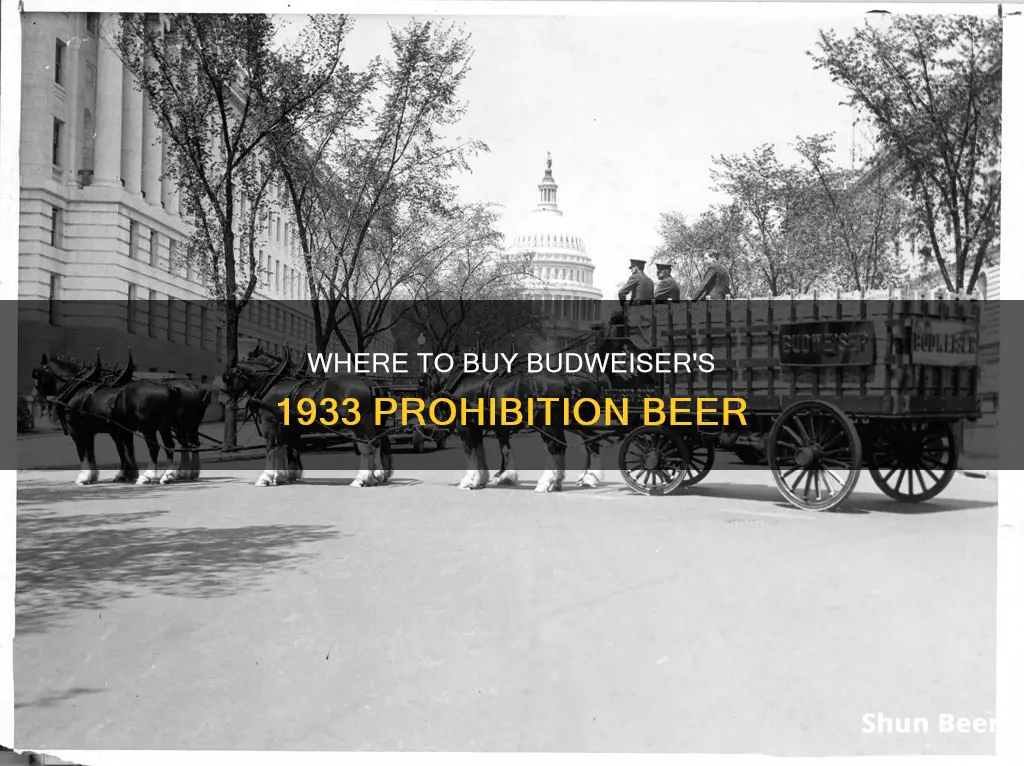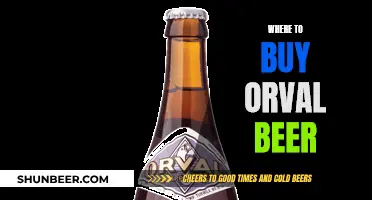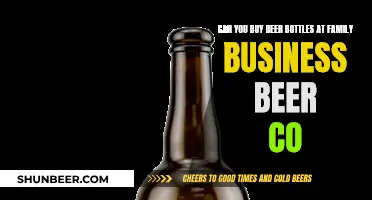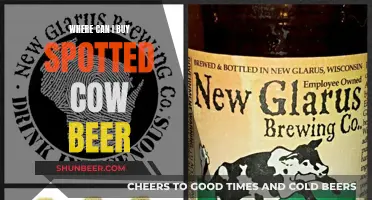
Budweiser has released a limited-edition 1933 Repeal Reserve Amber Lager, a recreation of a beer brewed by Adolphus Busch in the pre-Prohibition era. The beer was initially brewed for his friends and local community but, due to the onset of Prohibition in 1920, it was not distributed widely outside the St. Louis area. Budweiser's limited-edition release celebrates the end of Prohibition and the determination of Americans during that time. The beer is available across the United States, with Budweiser partnering with Drizly to deliver the beer to drinkers across the country.
| Characteristics | Values |
|---|---|
| Name | Budweiser 1933 Repeal Reserve Amber Lager |
| ABV | 6.1% |
| Calories | Not mentioned |
| Ingredients | Hops, yeast, filtered water |
| Brewing Process | Brewed the same way Budweiser has been brewed for 140 years, with a distinctive beechwood aging process |
| Taste | Smooth Golden Lager taste, crisp refreshment, rich caramel-malt taste |
| Packaging | Vintage Budweiser stubby bottle |
| Availability | Limited edition, nationwide in the US |
What You'll Learn

Budweiser 1933 Repeal Reserve Amber Lager
The Budweiser 1933 Repeal Reserve Amber Lager is a limited-edition beer that was released nationwide to celebrate the Repeal of Prohibition. The recipe behind the beer dates back to the pre-Prohibition era when Adolphus Busch created and brewed a special Amber Lager for his friends and local community to enjoy. However, due to the onset of Prohibition in 1920, the beer was not distributed widely outside the St. Louis area until its limited release in 2017.
The Budweiser 1933 Repeal Reserve Amber Lager has a light, hoppy aroma and a rich caramel-malt taste. With 6.1% ABV, it has a higher alcohol content than the original Budweiser, which is 5%. The lager is packaged in a vintage Budweiser stubby bottle, reminiscent of the pre-Prohibition era.
To commemorate the launch of the 1933 Repeal Reserve, Budweiser partnered with Lyft to offer New Yorkers (21+) a unique experience of riding in authentic vintage cars from the 1930s. During the ride, passengers could learn about the newly released beer while cruising through the famous streets of New York, including landmarks and neighbourhoods integral to Prohibition. Budweiser also partnered with Drizly to offer a special discount code for $5 off the first purchase of the 1933 Repeal Reserve.
The release of the Budweiser 1933 Repeal Reserve Amber Lager is a celebration of an important part of American history and a tribute to the country's determination during the Prohibition era, when the brand and the country faced 13 years without beer. It is a chance for beer lovers to experience and taste a piece of history, raising a cold one to America's resilience and perseverance.
Vonu Beer: Where to Buy and Enjoy It
You may want to see also

Breweries in St. Louis
St. Louis, Missouri, is home to a thriving community of breweries, from large-scale operations to small, independent brewers. The city has a long history of brewing, dating back over 165 years when German brewers first took advantage of the natural caves under the city to ferment their lagers.
Anheuser-Busch
One of the most famous breweries in St. Louis is Anheuser-Busch, which has been a fixture in the city since the 1850s. The company's flagship brewery features elaborate, red-brick buildings in the German Romanesque style, with rounded arches and embellished cornices. Anheuser-Busch produces more than 30 brands of beer and is a hub for brewing innovation, using high-quality ingredients sourced from American farmers.
Schlafly
Schlafly is the original and largest independent brewery in St. Louis. With over 60 styles of beer on offer, Schlafly runs four restaurants and bars in the city. The historic Schlafly Tap Room in Downtown West and Schlafly Bottleworks in Maplewood are popular spots to enjoy a wide range of beers, from classic to experimental styles.
Side Project Brewing
Based in Maplewood, Side Project Brewing was named the No. 2 brewer in the world by RateBeer in 2020. The brewery specialises in barrel-aged beers, including rustic saisons, wild ales, and spirit barrel-aged ales.
WellBeing Brewing Co.
WellBeing Brewing Co. focuses on craft, non-alcoholic beers. The company aims to set itself apart in the non-alcoholic category by offering distinct craft styles, such as craft beer minus the booze.
4 Hands Brewing Co.
Located in the LaSalle Park neighbourhood, 4 Hands Brewing Co. has one of St. Louis' favourite tasting rooms. Founded in 2011, the brewery offers a wide range of year-round, seasonal, and limited-edition beers and seltzers. Their American pale ale, City Wide, benefits the community, with a dollar donated for every case sold.
Alpha Brewing Co.
Alpha Brewing Co. is known for its sour beers, with a range that includes fruited and barrel-aged options. Their brewery and taproom in the Tower Grove South neighbourhood also offer trusty drafts, such as Cowboy's Last Ride, an easy-drinking Belgian-style blonde ale, and Parity Error, an American IPA.
Urban Chestnut Brewing Co.
Urban Chestnut Brewing Co. pays homage to the heritage of beer with classically crafted European styles, while also contributing to the revolution of craft beer with modernised, artisanal American styles. The company has a bierhall in The Grove, a biergarten in Midtown, and a brewery in Bavaria.
Other Notable Breweries
- 2nd Shift Brewing
- Narrow Gauge Brewing Co.
- Bluewood Brewing
- Perennial Artisan Ales
- Civil Life Brewing
- Heavy Riff Brewing
- Modern Brewery
- Square One Brewery and Distillery
Purchasing Beer: Fake IDs and the Art of Deception
You may want to see also

Budweiser Prohibition Brew
The Budweiser Prohibition Brew is a non-alcoholic beer with 0.0% ABV and ~25 calories. It is inspired by the real non-alcoholic recipe that kept Budweiser drinkers together during Prohibition. The Prohibition Brew is brewed the same way Budweiser has been brewed for 140 years, with the same key ingredients, choice hops, yeast, and filtered water, along with a distinctive beechwood aging process. During the final stages of aging, a special process is used to remove the alcohol, resulting in a taste that stays true to Budweiser's standards.
Where to Buy Budweiser Prohibition Brew
You can try searching for Budweiser Prohibition Brew on websites such as BeerMenus, which allow you to find local businesses that sell specific beers. However, as of September 2024, BeerMenus showed no nearby places that carried Budweiser Prohibition Brew. The website does offer the option to be notified by email when local businesses start carrying the beer.
History of Budweiser and Prohibition
The Prohibition era, which began in 1920, marked a significant challenge for American brewers, including Budweiser. During this time, Budweiser created a non-alcoholic beverage called Bevo, which was an immediate success, selling over 2.2 million cases in six months. However, with the end of Prohibition in 1933, Bevo sales declined, and Budweiser shifted its focus back to alcoholic beverages.
Budweiser 1933 Repeal Reserve Amber Lager
To commemorate the end of Prohibition, Budweiser released a limited-edition 1933 Repeal Reserve Amber Lager, based on a pre-Prohibition recipe by Adolphus Busch. This beer has a higher ABV than the original Budweiser, at 6.1%, and is packaged in a vintage stubby bottle. The release of this beer was accompanied by a marketing campaign that included antique cars in partnership with Lyft, offering New Yorkers a chance to experience a ride in a vintage car from the 1930s.
Rochester, NY: Beer Buying Time Constraints
You may want to see also

Budweiser's Prohibition-era history
The Prohibition era, which began in 1920, was a challenging time for the brewing industry in the United States. Budweiser, however, managed to survive and even thrive during this period by adapting their product offerings and business strategies. Here is a detailed look at Budweiser's Prohibition-era history:
Non-Alcoholic Beers and Diversification
During Prohibition, Budweiser introduced a non-alcoholic beer called Bevo, which was marketed as a "soft drink" or "near beer". It was an immediate success, selling over 2.2 million cases in just six months after its launch in 1916. However, as consumers increasingly turned to bootlegging and speakeasies for their alcohol fix, Bevo sales declined, and the company was forced to adjust its strategy once again.
Innovation and Expansion
Budweiser diversified its product portfolio by introducing more than 25 different non-alcoholic offerings, including soft drinks, corn syrup, frozen egg products, and even truck bodies. They also sold soda, carbonated coffee, and tea-flavoured drinks, such as Kaffo and Buschtee. The company's vehicle department came up with innovative products like the Lampsteed Kampkar camper and the Bevo Victory Boat, a vehicle designed for both land and water use. Budweiser even supplied police vans used by Prohibition officers to crack down on moonshiners and bootleggers.
Survival and Recovery
The Busch family, who owned Budweiser, had anticipated the possibility of Prohibition as early as the 1890s. This foresight, combined with their significant real estate holdings and investments in non-alcoholic drinks, helped them survive the 13 dry years. When Prohibition ended in 1933, Budweiser was quick to resume beer production and celebrate the occasion with a limited-edition brew.
Commemorating the End of Prohibition
In 2017, Budweiser released a limited-edition 1933 Repeal Reserve Amber Lager to commemorate the end of Prohibition. This brew was based on a pre-Prohibition recipe created by Adolphus Busch and originally brewed for his friends and local community. The 1933 Repeal Reserve, with its higher ABV and vintage packaging, paid tribute to the resilience of the brand and the country during the Prohibition era.
Legacy and Impact
Budweiser's ability to adapt and innovate during Prohibition contributed to its long-term success. The company's commitment to its employees and its quick resumption of beer production after Prohibition ended positioned it well for the future. Today, Budweiser continues to be one of the most recognised beer brands worldwide, and its Prohibition-era history remains an integral part of its story.
White Clay Beer: Where to Buy This Specialty Brew
You may want to see also

Budweiser's Prohibition-era marketing campaign
The Prohibition era, lasting from 1920 to 1933, was a challenging period for alcoholic beverage companies like Anheuser-Busch, the owner of Budweiser. However, Budweiser's creative and adaptive marketing strategies during this time helped them not only survive but also set the foundation for their future success. Here's an overview of their Prohibition-era marketing campaign:
Continuing Brand Awareness:
Budweiser didn't let the prohibition stop them from keeping their brand in the public eye. They continued advertising their brand with emotional and patriotic ads that featured famous American pioneers and heroes like Thomas Jefferson and George Washington. These ads aimed to create an emotional connection with their customers, even when they couldn't legally consume Budweiser beer.
Health-focused Messaging:
To appeal to those who supported the alcohol ban, Budweiser ran ads highlighting the health benefits of their beer. These ads positioned Budweiser as a refreshing drink, even suggesting it was as nourishing as liquid bread.
Anheuser-Busch introduced Bevo, a near beer brand, to the United States Armed Forces, which had already imposed an alcohol ban in 1916. During Prohibition, they aggressively marketed Bevo nationwide, offering those craving a beer-like experience a close alternative.
Non-Alcoholic Focus:
In addition to Bevo, Anheuser-Busch also promoted their existing non-alcoholic products, such as their malt and frozen egg offerings. They even developed new non-alcoholic beverages to make up for lost sales due to the prohibition.
Anti-Prohibition Movement:
Budweiser didn't shy away from taking a stand against Prohibition. They joined the anti-prohibition movement, advocating for the eventual repeal of the ban.
Limited-Edition Releases:
In 2017, Budweiser released a limited-edition 1933 Repeal Reserve Amber Lager to commemorate the anniversary of Prohibition's repeal. This brew was based on a pre-Prohibition recipe by Adolphus Busch that had only been distributed in the St. Louis area before the onset of Prohibition in 1920. The release of this historic beer was accompanied by a full marketing campaign, including TV commercials, digital content, and appearances by the iconic Budweiser Clydesdales.
Creative Promotions:
To promote the 1933 Repeal Reserve, Budweiser partnered with Lyft to offer New Yorkers a chance to ride in vintage cars from the 1930s and experience the Prohibition era first-hand. They also ran creative promotions, like interrupting a packed bar in Atlanta with a fake news break announcing the return of Prohibition, capturing patrons' reactions and their chants of "We want beer"!
Buying Beer in Casablanca, Morocco: What You Need to Know
You may want to see also
Frequently asked questions
Budweiser 1933 Prohibition Beer is available for purchase on BeerMenus.
Budweiser 1933 Prohibition Beer is a limited-edition Amber Lager brewed to commemorate the anniversary of the start of Prohibition on January 16, 1920.
Budweiser 1933 Prohibition Beer has an ABV of 6.1%, which is higher than the original Budweiser.
Budweiser 1933 Prohibition Beer has a light, hoppy aroma and a rich caramel-malt taste.
No, Budweiser 1933 Prohibition Beer is not a non-alcoholic beer. However, Budweiser also offers a non-alcoholic Prohibition Brew with 0.0% ABV.







